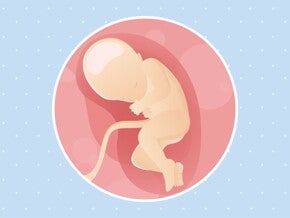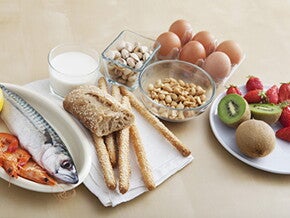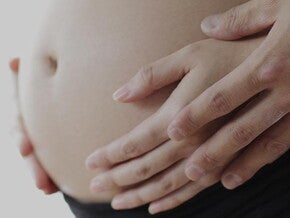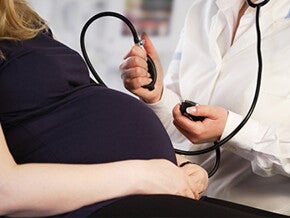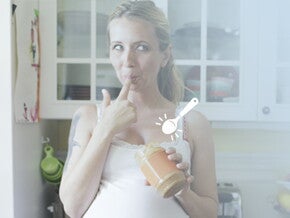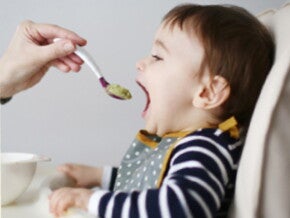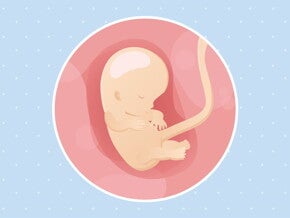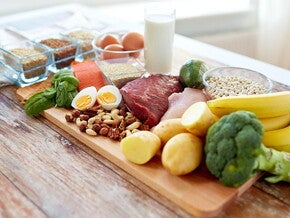
Breastfeeding mom's diet and food choices
Should I eat a special breastfeeding diet?
Similar to pregnancy; the golden rule for breastfeeding moms: eat a balanced diet. It is important to keep up the good habits acquired during pregnancy. In general, it is advisable to eat 500 calories more than the normal amount you consumed before getting pregnant. However, this could be too much for some women and too little for others, depending on the energy reserves built up during pregnancy and each woman´s level of physical activity.
Include 2 servings of fresh fruits and vegetables each everyday in your meals and snacks to get all the necessary vitamins and minerals, and keep well hydrated by drinking 1.5 to 2 liters of water a day, especially during hot weather. Your body also needs calcium in order to maintain good bone mass, iron to avoid deficiencies, proteins and all of the other nutrients that you will pass along to your baby in your milk. By getting a good supply of complex carbohydrates at breakfast time, you'll have the energy to start your day right. At lunch and dinner time, have potatoes, pasta or whole-grain rice, or beans and legumes. This will provide you with a constant source of energy throughout the day. You can also eat smaller, more frequent amounts by having a healthy mid-morning snack (for example: a medium-sized apple with light yogurt). Never skip breakfast, even if your baby disturbs your normal daily cycles
Can a poor diet affect my breast milk?
Recent studies have shown that your breast milk will still be of good quality for your baby, even if you do not eat properly. In fact, the most important thing is for you to have good nutrition for the sake of your own health and your general condition. Otherwise, your body will ensure the quality of your milk is maintained at the expense of your own reserves of nutrients, such as your body´s calcium reserves. You need to recover from the fatigue of your delivery in order to be able to care for your baby. This fatigue could lead to a condition of stress that could cause your breast milk production to decrease.
Will I lose weight when breastfeeding?
They say that breastfeeding helps with weight loss. That is true: your body´s hormones caused you to store about 3-4kg of fat for breast-feeding your baby. You will lose these reserves gradually as you breast-feed, simply because these reserves will be used during the production milk. In addition, your body is still working in “burnout” mode, like that of an athlete, and it needs to recover from the fatigue of childbirth, so just be patient!
What can my baby taste in my breast milk?
If you ate everything when you were pregnant, you can continue doing so. People say that certain foods like cabbage, asparagus, garlic, onions, bell peppers and certain condiments have a reputation for giving mother's milk "a strange taste," but that doesn't bother the baby, because he or she is already familiar with them since they were present in the amniotic fluid. Your culinary habits and culture have already been passed along to your baby during pregnancy, and afterwards through your milk. The formation of your baby’s tastes started when he or she was still in the womb.
How can I increase milk production?
There are a lot of “old wives' tales” out there regarding how to improve your breast milk production. Fennel tea, barley malt and hops in alcohol-free beer, white thistle, coriander (cilantro), green anise, dill, basil, lentils and quinoa have all been associated with promoting milk production. There is no scientific evidence to back up these claims. Do not consume large amounts, because plants contain active ingredients that can be harmful to your baby in large doses. What we do know for certain is that you should drink plenty of fluids to promote milk production: 1.5 to 2 liters of liquid a day. There is a myth that this should largely be milk; however, hydration is what matters most, so water is the best option. You should also rest after breastfeeding your baby.
What should I avoid eating when breastfeeding?
Be careful with toxic or potentially toxic products that can be passed through your milk: caffeine, alcohol, nicotine, medications, and pesticides found on fruit peels and skins. Hence, try to avoid or reduce intake of caffeinated beverages like coffee or cola, quit smoking, do not drink alcohol or self-medicate and ensure you wash your fruits and vegetables carefully.
Take advantage of this wonderful adventure that you are beginning with your baby: it is enriching in every way, and always will be. Pregnancy and breastfeeding are the times when many mothers learn about health and nutrition. Many mothers have stated that they learned how to eat well, how to shop correctly and even how to cook delicious and healthy meals during and after their pregnancy.



